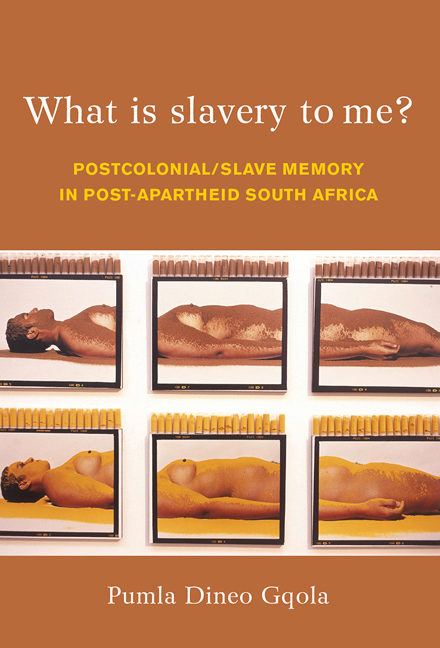Book contents
- Frontmatter
- Contents
- Dedication
- Acknowledgements
- Acronyms
- Introduction: Tracing (re)memory, thinking through echoes of colonial slavery in contemporary South Africa
- 1 Remembering differently: repositioned coloured identities in a democracy
- 2 (Not) Representing Sarah Bartmann
- 3 Whiteness remixed, or remembered impurity, shame and television
- 4 ‘As a slave you have to have faith or you'll give up’: Cape Malay/Muslim identity clusters in Cape Town
- 5 ‘Is the secret in cooking?’ Coded food, spice routes and processing Malay identities
- Conclusion: Unshackling memory, rememorying agency
- Endnotes
- References
- Index
4 - ‘As a slave you have to have faith or you'll give up’: Cape Malay/Muslim identity clusters in Cape Town
Published online by Cambridge University Press: 21 April 2018
- Frontmatter
- Contents
- Dedication
- Acknowledgements
- Acronyms
- Introduction: Tracing (re)memory, thinking through echoes of colonial slavery in contemporary South Africa
- 1 Remembering differently: repositioned coloured identities in a democracy
- 2 (Not) Representing Sarah Bartmann
- 3 Whiteness remixed, or remembered impurity, shame and television
- 4 ‘As a slave you have to have faith or you'll give up’: Cape Malay/Muslim identity clusters in Cape Town
- 5 ‘Is the secret in cooking?’ Coded food, spice routes and processing Malay identities
- Conclusion: Unshackling memory, rememorying agency
- Endnotes
- References
- Index
Summary
From far away, trailing just out of reach. Echoes. Messages distorted, yet vaguely familiar. Memory.
(Chude-Sokei 1997: 14)Recent theorisations of diasporic patterns centre on the politics of home(lessness), migration and displacement. Because of the differing character of global relocations, however, the indiscriminate application of one set of diaspora theories to make sense of the Cape Malay diaspora examined in this chapter is untenable. Using a blend of diaspora theorisations to filter meanings seems a more productive lens through which to decode the enactment of Malayness in contemporary South Africa. For, while extensive attempts have been made to conjecture the shifting dynamics of African slave, South Asian colonial indenture and Muslim diasporas, these have been theorised for the most part as mutually exclusive in academic literature, with notable exceptions in the theorisation of West Indian diasporas. Where intersections emerge, they do so in relation to more contemporary clusterings of certain identities. Deciphering the functions of diaspora for the articulation of Malay identities in Cape Town exists at the nexus of the aforementioned forced migrations, since Cape Malay or Cape Muslim communities, in their self-identification as such, foreground their South East Asian Muslim foreparents enslaved by the Dutch and British and transported to the Cape.
Most scholars of diaspora trace the history of what Sonita Sarker labels ‘Diaspora (with an upper case D)’ (2002: 2) to Jewish dispersal from Palestine by both Babylonians and later Romans. They nonetheless note how the term has become ‘mobile’, as Vijay Mishra posits, to incorporate within its ‘updated’ meaning later streams of forced and voluntary migrations (1993: 34–35). The latter has increasingly come to refer to diasporic formations of Africans, South Asians and Caribbean peoples ‘to the “West”’, movements which cannot be read as separate from European colonial undertakings (Cohen 1997; Sarker 2002). In spite of the increasing looseness of what the term has come to mean, Robin Cohen argues that diasporic people are not just outside of their ‘natal (or imagined natal) territories’ but also share cultural baggage, often in the form of language, religion and resultant culture. It is within these arenas that collective memory is shown to be the organising principle behind diasporic identity.
- Type
- Chapter
- Information
- What is Slavery to Me?Postcolonial/Slave Memory In Post-Apartheid South Africa, pp. 133 - 164Publisher: Wits University PressPrint publication year: 2010



